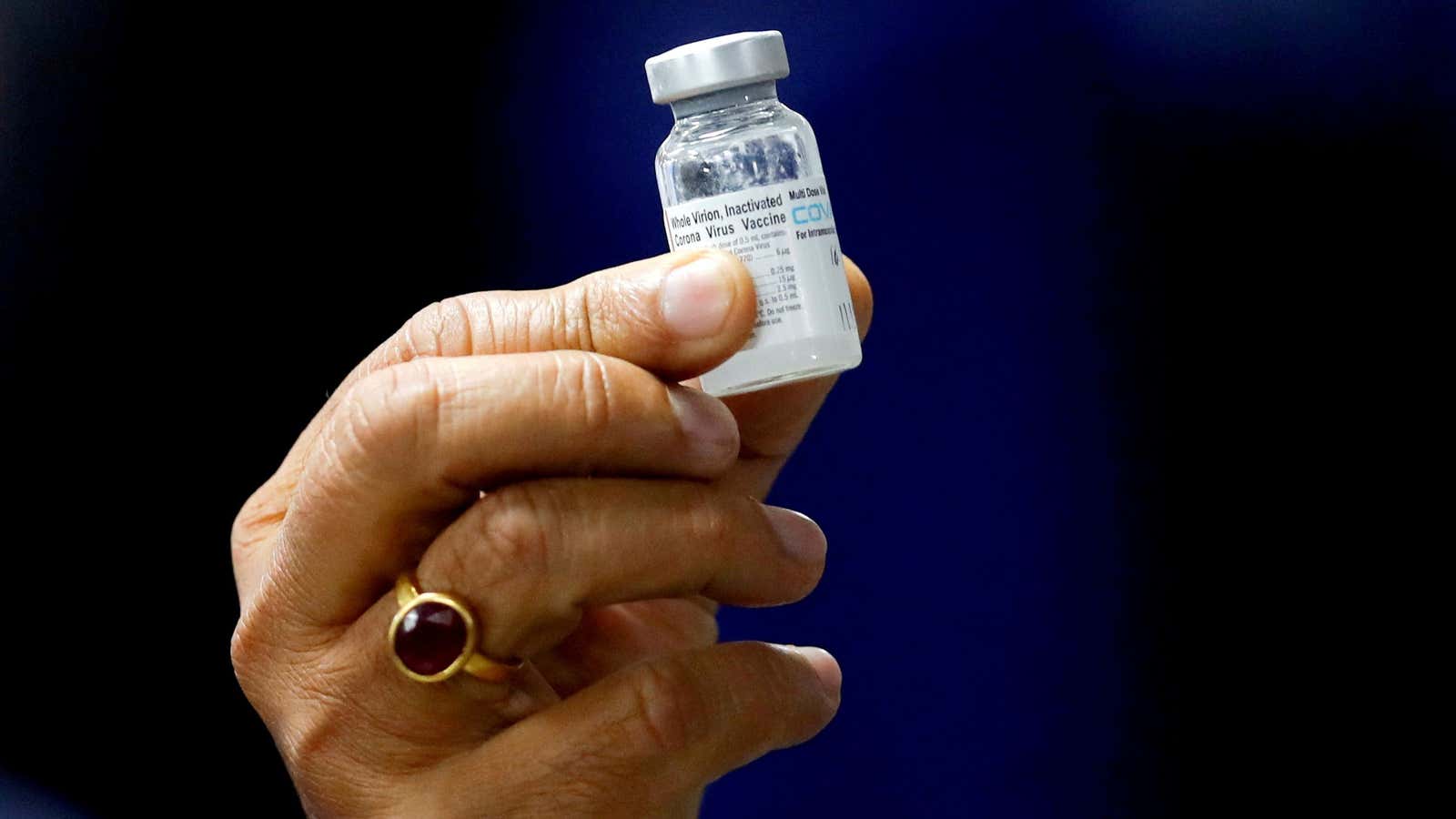India’s homegrown Covid-19 vaccine is at the epicentre of a controversy again.
Brazil’s health minister Marcelo Queiroga announced yesterday (June 29) the country would suspend a $324 million contract to buy 20 million doses of Bharat Biotech’s Covaxin. The announcement comes amid a probe into allegations of irregularities in the procurement of the vaccine that are entangling president Jair Bolsonaro, though the health ministry has said in a statement that an initial analysis doesn’t show irregularities in the contract.
“We suspended the deal as a simple preventive measure, since there are complaints that could not be explained well by the complainant, so we opened a preliminary investigation last week,” said Wagner de Campos Rosário, of the federal office of the comptroller general, during a press conference with Queiroga, according to CNN Brasil.
While pledging to be quick in investigating the allegations, Rosário added that he hopes the process wouldn’t take “more than 10 days.”
Allegations against Bolsonaro
Bolsonaro faces an allegation of overlooking possible corruption in a deal to buy Covid-19 vaccines for the country, which he has denied.
The controversy reportedly started when Luis Ricardo Miranda, a whistleblower at the health ministry raised suspicions about the vaccine deal with India’s Bharat Biotech.
Miranda had allegedly told the president in March that he was facing pressure from an aide to one of Bolsonaro’s closest allies, the former health minister, to sign a contract to procure vaccines at $15 per dose from Precisa Medicamentos, the Brazilian representative of Bharat Biotech. Last week he told a Senate panel examining Bolsonaro’s handling of the pandemic that an invoice for a $45 million advance payment to an entity not named in the February contract caused him further concern.
The price has raised eyebrows as the government apparently had offers from Pfizer in 2020 to procure millions of doses of its vaccine, which has a higher efficacy rate, at a competitive price. Covaxin, developed by India’s Bharat Biotech, has already faced questions in India after it was approved for local use while trials were still ongoing, and has yet to publish its final stage trial data in full.
Following the allegations, the comptroller general’s office, which is responsible for ensuring transparency in the use of public assets, opened an investigation into the deal on June 24. Detailing some of the aspects of the contract they would examine, the statement noted (Portguese, pdf) that payment had been sought even though no deliveries had been made yet by Bharat Biotech, which appeared to be a breach of contract as the first delivery was due in March.
Precisa Medicamentos, Bharat Biotech’s partner in Brazil, which is also helping to carry out a Phase III Covaxin trial there, has said that it is confident the probe will confirm all legal requirements were followed.
What has Bolsonaro said about the Covaxin deal?
The president has denied any wrongdoing. The far-right leader has stated that the price of Covaxin was along the lines of what other countries are paying for vaccines. He also pledged to take action if any “corruption was discovered” in his government.
“The government’s position has always been to only carry out purchases of vaccines after they are approved for use by federal health authority Anvisa,” he added.
The accusations present fresh trouble for Bolsonaro who is already facing an investigation into his handling of the Covid-19 pandemic, with Brazil one of the most affected countries with more than half a million deaths.
What Bharat Biotech said about the Brazil deal
Bharat Biotech released a statement today (June 30) saying that the procurement process was being misrepresented in the media.
“The procurement process for Covid-19 vaccines and several vaccines for routine immunisation follow a common process which is widely accepted, and established in industry,” it said. As part of the process, companies issue a preliminary invoice detailing the sale terms in order to firm up a purchase order from a government, it explained.
“Based on the invoice, the health ministry pays the amount in advance. Once the payment is received, the company proceeds to supply the agreed quantities and within the agreed timelines,” the company statement said. It added that during the eight month-long process with Brazil ongoing since November 2020, “a step by step approach has been followed towards contracts, and regulatory approvals.”
A setback on India’s vaccine diplomacy
Like China, India has also seen its ability to produce vaccines for other parts of the world as an important demonstration of soft power. But those efforts took a hit after the country abruptly stopped fulfilling commitments to sending Indian-made vaccines overseas after facing a severe second wave and a shortage of vaccines at home.
The Serum Institute of India, a major vaccine supplier for the Covax effort of the World Health Organization to better distribute vaccines globally, has been unable to produce large quantities of the Oxford-AstraZeneca vaccine, known in India as Covishield, as quickly as the global vaccine program needs.
While the federal probe in Brazil may ultimately show all procedures were followed, the outcry in the country certainly dims the glow around Indian-developed Covaxin’s first global exports.
